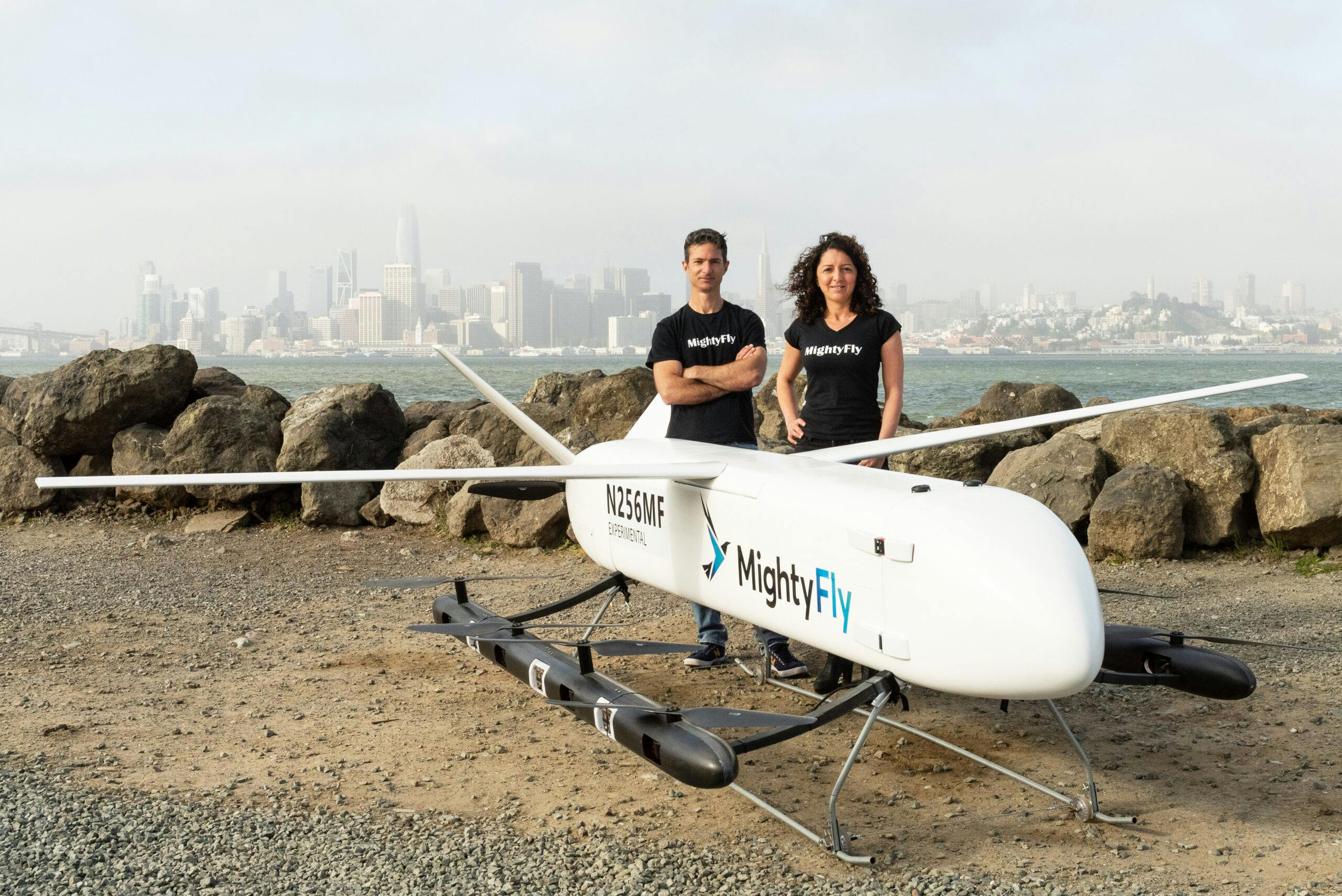MightyFly’s Next-Generation Drones Have Sky-High Potential
The company is building a solution that improves unit economics, while bringing speed and cost savings.

Photo courtesy of MightyFly

Tim Chae
Managing Partner
PUBLISHED
2021.04.27
When we first met MightyFly’s founders Manal Habib and Scott Parker, we quickly knew they had that perfect combination of technical expertise and tenacity–a world-class team of experienced drone engineers capable of reshaping logistics.
Their vision is a lofty one: to build large autonomous cargo aircrafts that can replace delivery trucks by providing more efficiency and cost savings. The way Manal explains it: “We need to take those UPS and FedEx vans off the ground and into the skies.”
MightyFly is developing drones that can fly, say, between Los Angeles and San Francisco at speeds of up to 150 mph while carrying up to 500 pounds of cargo (or an estimated 150 packages). Currently, most action centers on last mile delivery via smaller aircraft transporting items weighing at most a couple pounds. Amazon PrimeAir, Zipline, Matternet and Google’s Wing have that capacity.
But as e-commerce accelerates and creates demand for expedited shipping, logistics players are largely struggling to deliver fast and affordable services. Ground transport is only cost-effective when vehicles are fully loaded, which can be challenging to pull off with same day deliveries. Manal wanted a solution that improved the unit economics, while bringing speed and cost savings. To do so, Manal and Scott built a larger electric vertical takeoff and landing (eVTOL) drone with hybrid engine systems.
That requires taking on significant technical challenges, but we believe Manal and Scott can deliver. Working on a shoestring budget, we watched them make meaningful progress since entering our four-month accelerator program in October, which is why we have decided to increase our investment in the company.
Over six months, they developed a prototype and tested it in Half Moon Bay, California after receiving a coveted special airworthiness certification from the FAA. They’re now prepping more tests in the U.S., including a potential pilot in Australia that will help build a strong case for FAA approval.
Regulations are still unfolding for commercial drone operators, but we’re seeing positive momentum. With COVID-19 accelerating e-commerce and exposing weaknesses in supply chains, the FAA is beginning to fast-track regulations. This points to more regulatory approvals on the horizon for commercial drones flights, including long-range routes with higher weight clearances.
As those develop, MightyFly should find opportunities to deploy its technology at scale. One area is to offer enhanced mid-mile capabilities by integrating drones with existing ground infrastructure that handles the last mile. It can also help with B2B supply chains, such as managing inventory distribution for retailers looking to boost efficiency around in-store pickups.
Another key opportunity that could soon arrive is operating delivery routes for rural customers, who currently suffer from high shipping costs. From a regulatory standpoint these routes offer a simpler path to approval for flights beyond line-of-sight, because drones would be travelling over sparsely populated areas.
Already, a market appears to be shaping up for larger delivery drones. David Benowitz who heads research at DroneAnalyst said that while the market and media have hyped the last mile package delivery space, he expects supply chain deliveries for large enterprises and government agencies will be a part of the market that will more quickly deploy aircraft.
When Manal is not busy developing her autonomous aircraft, she is building a two-seater airplane in her garage on week-ends. Born in Tangiers, Morocco, she grew up gazing at the North African sky with dreams of becoming an astronaut. An engineering and math whizz, she fought her way onto a U.S. exchange program, speaking little English, and interned with NASA. She then did her ungrad at MIT, studying aeronautics and astronautics, before getting her start as a software engineer with companies such as Oracle.
Scott is a mechanical engineer who’s spent nearly 15 years working on drones after starting out in Australia as a defense contractor. He later joined a string of Bay Area drone startups, including Volansi, where he led product strategy.
The pair met while working at Zipline, which makes drones that parachute medical supplies. They operated in complementary roles and struck up a friendship: Manal focused on writing software for autonomous flight controls while Scott handled aircraft design and manufacturing. That experience convinced the duo that there’s a need and market for drones with additional functionality and range.
The playing field is still wide open when it comes to larger cargo drones. The barriers to entry are high, but we expect to see leaders emerge in this space. Led by great founders, we believe MightyFly can take drone deliveries to new heights.
Legal Disclaimers: 500 Startups programs (including accelerator programs), investor education services, strategic partnership consulting services and events are operated by 500 Startups Incubator, L.L.C. (together with its affiliates, “500 Startups”) and the funds advised by 500 Startups Management Company, L.L.C. do not participate in any revenue generated by these activities. Such programs and services are provided for educational and informational purposes only and under no circumstances should any content provided as part of any such programs, services or events be construed as investment, legal, tax or accounting advice by 500 startups or any of its affiliates.
The views expressed here are those of the individual 500 Startups personnel, or other individuals quoted and are not the views of 500 Startups or its affiliates. Certain information contained herein may have been obtained from third-party sources, including from portfolio companies of funds managed by 500 Startups. While taken from sources believed to be reliable, 500 Startups has not independently verified such information and makes no representations or warranties as to the accuracy of the information in this post or its appropriateness for a given situation. In addition, this content may include third-party advertisements or links; 500 Startups has not reviewed such advertisements and does not endorse any advertising content contained therein.
This content is provided for informational purposes only, and should not be relied upon as legal, business, investment, tax or accounting advice. You should consult your own advisers as to those matters. References to any securities or digital assets are for illustrative purposes only, and do not constitute an investment recommendation, offer to sell or solicitation to purchase any investment securities, or offer to provide investment advisory services. Furthermore, this content is not directed at nor intended for use by any investors or prospective investors, and may not under any circumstances be relied upon when making a decision to invest in any fund managed by 500 Startups. (An offering to invest in an 500 Startups fund will be made only by the private placement memorandum, subscription agreement, and other relevant documentation of any such fund and should be read in their entirety.) Any investments or portfolio companies mentioned, referred to, or described are not representative of all investments in vehicles managed by 500 Startups, and there can be no assurance that the investments will be profitable or that other investments made in the future will have similar characteristics or results.
Charts and graphs provided herein are for informational purposes solely and should not be relied upon when making any investment decision. Past performance is not indicative of future results. The content speaks only as of the date indicated. Unless otherwise expressly stated, figures are based on internal estimates and have not been independently verified. Any projections, estimates, forecasts, targets, prospects, and/or opinions expressed in these materials are subject to change without notice and may differ or be contrary to opinions expressed by others. All logos and trademarks of third parties referenced herein are the logos and trademarks of their respective owners and any inclusion of such trademarks or logos does not imply or constitute any approval, endorsement or sponsorship of 500 Startups by such owners.
Please see Section 2 of our Terms of Use for additional important information.

Tim Chae
Managing Partner
Tim is a General Partner at 500 Global and manages 500's San Francisco-based global fund, investments, and accelerator program. Among his investments include Spoon, OP.GG, PeopleFund, More Labs, Rachio, Dano, and Famebit (acquired by Google). In 2016, he was named to the Forbes Asia's inaugural '30 Under 30" in Finance and Venture Capital. Continuing his career in VC, Tim became one of the youngest GPs at the age of 23 in 2015 with the closing of $15M South Korea-based fund, 500 Kimchi, L.P. Prior to 500, Tim founded several bootstrapped and venture-backed startups, including PostRocket which provided Facebook newsfeed optimization for brands and took part in Batch 3 of 500’s Seed Accelerator program. As an entrepreneur, Tim was named one of the top Youth Entrepreneurs in US by NFIB and McKelvey Foundation, and almost simultaneously, also became one of the youngest VCs at the age of 19, as an Associate at a seed-stage micro-VC firm in Boston.

